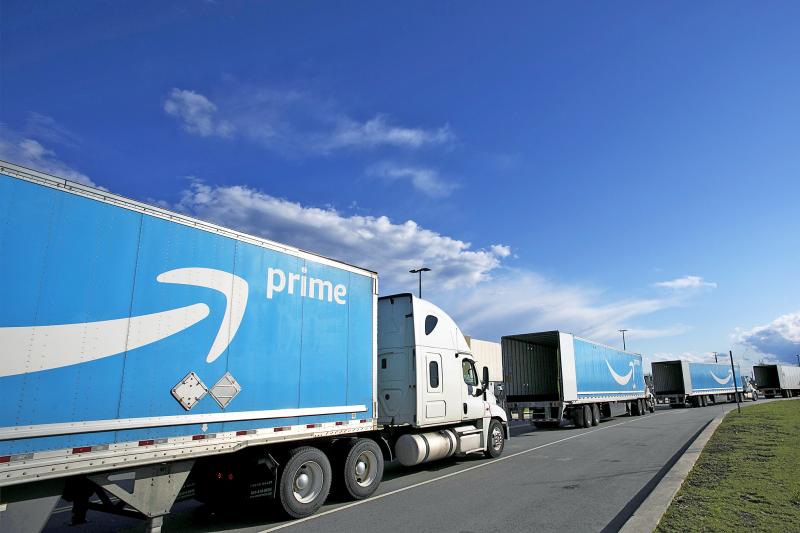Amazon.com Inc was on Tuesday hit with an antitrust suit from the US capital city Washington, which said the tech giant abuses its dominant position in online retail sales, harming consumers.
The suit filed by the office of District of Columbia Attorney General Karl Racine says that Amazon’s control of 50 to 70 percent of US e-commerce sales allegedly results in higher consumer prices.
“Amazon’s online retail sales platform benefits from, and is protected by, Amazon’s anticompetitive business practices,” the suit filed in the District of Columbia Superior Court says. “Far from enabling consumers to obtain the best products at the lowest prices, Amazon instead causes prices across the entire online retail sales market to be artificially inflated, both for products sold on Amazon’s online retail sales platform and on its competitors’ online retail sales platforms.”

Photo: AP
Amazon has long said that it delivers lower prices for consumers, speeding up delivery in the process.
“The DC Attorney General has it exactly backwards — sellers set their own prices for the products they offer in our store,” Amazon said in response to media inquiries. “Amazon takes pride in the fact that we offer low prices across the broadest selection, and like any store we reserve the right not to highlight offers to customers that are not priced competitively.”
The lawsuit could force Amazon to feature higher prices on its e-commerce platform in an outcome that would be at odds with antitrust law, the Seattle-based company said.
The lawsuit comes amid heightened scrutiny of large tech platforms that have increased their dominance during the COVID-19 pandemic.
US state and federal antitrust enforcers last year filed suits that targeted Facebook Inc and Google for alleged illegal dominance in their respective markets.
Racine’s lawsuit seeks to stop Amazon from “anticompetitive” practices and calls for damages and other penalties.
The research firm eMarketer said that Amazon’s share of US e-commerce was 39.8 percent last year and was expected to increase to 44.1 percent this year, representing US$367.19 billion, with growth larger than that of any other company.
The lawsuit says that Amazon uses practices that prevent third-party sellers on its platform from offering their products at lower prices on rival Web sites.
Until 2019, Amazon required sellers to sign a “price parity” agreement that prevented them from selling at lower prices, which “artificially raised the price of goods to consumers across the online retail sales market.”
The complaint says that Amazon ended this practice in 2019 under pressure from the US Congress and regulations, but implemented “an effectively identical substitute,” which allows Amazon to impose sanctions on sellers that offer lower prices elsewhere.
Amazon in the first three months of this year reported a profit of US$8.1 billion, triple the amount from a year earlier, amid soaring sales during the pandemic.

Semiconductor shares in China surged yesterday after Reuters reported the US had ordered chipmaking giant Taiwan Semiconductor Manufacturing Co (TSMC, 台積電) to halt shipments of advanced chips to Chinese customers, which investors believe could accelerate Beijing’s self-reliance efforts. TSMC yesterday started to suspend shipments of certain sophisticated chips to some Chinese clients after receiving a letter from the US Department of Commerce imposing export restrictions on those products, Reuters reported on Sunday, citing an unnamed source. The US imposed export restrictions on TSMC’s 7-nanometer or more advanced designs, Reuters reported. Investors figured that would encourage authorities to support China’s industry and bought shares

TECH WAR CONTINUES: The suspension of TSMC AI chips and GPUs would be a heavy blow to China’s chip designers and would affect its competitive edge Taiwan Semiconductor Manufacturing Co (TSMC, 台積電), the world’s biggest contract chipmaker, is reportedly to halt supply of artificial intelligence (AI) chips and graphics processing units (GPUs) made on 7-nanometer or more advanced process technologies from next week in order to comply with US Department of Commerce rules. TSMC has sent e-mails to its Chinese AI customers, informing them about the suspension starting on Monday, Chinese online news outlet Ijiwei.com (愛集微) reported yesterday. The US Department of Commerce has not formally unveiled further semiconductor measures against China yet. “TSMC does not comment on market rumors. TSMC is a law-abiding company and we are

FLEXIBLE: Taiwan can develop its own ground station equipment, and has highly competitive manufacturers and suppliers with diversified production, the MOEA said The Ministry of Economic Affairs (MOEA) yesterday disputed reports that suppliers to US-based Space Exploration Technologies Corp (SpaceX) had been asked to move production out of Taiwan. Reuters had reported on Tuesday last week that Elon Musk-owned SpaceX had asked their manufacturers to produce outside of Taiwan given geopolitical risks and that at least one Taiwanese supplier had been pushed to relocate production to Vietnam. SpaceX’s requests place a renewed focus on the contentious relationship Musk has had with Taiwan, especially after he said last year that Taiwan is an “integral part” of China, sparking sharp criticism from Taiwanese authorities. The ministry said

US President Joe Biden’s administration is racing to complete CHIPS and Science Act agreements with companies such as Intel Corp and Samsung Electronics Co, aiming to shore up one of its signature initiatives before US president-elect Donald Trump enters the White House. The US Department of Commerce has allocated more than 90 percent of the US$39 billion in grants under the act, a landmark law enacted in 2022 designed to rebuild the domestic chip industry. However, the agency has only announced one binding agreement so far. The next two months would prove critical for more than 20 companies still in the process